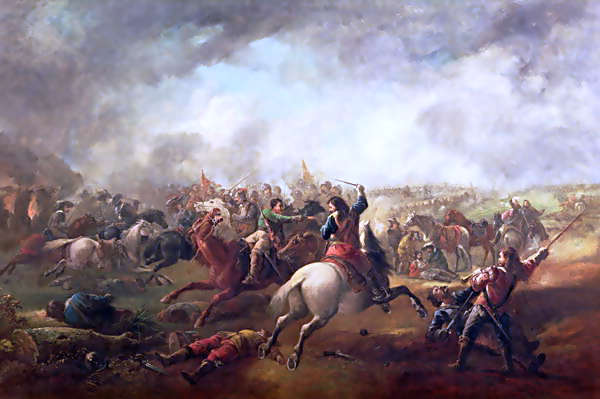Political
The middle decades of the 17th century are the period of the most intense political upheavals and shocking constitutional changes that Britain had not seen yet.
- Religious disputes + complaints over the royal perogative and unjust taxation lead to the Civil Wars of 1640
- Parliamentary troops fought in open rebellion against the King Charles I
- Charles was taken prisoner and tried before parliament and was executed in 1649- leaving England without a crowned head of state
- Stuart Monarchy is restored in 1660 when Charles II returns from exile and rides in triumph to London in 1660
- Restoration is widely celebrated and comes as a great relief to the nation.
- Over the previous 20yrs every part of the British Isles experienced military maneuvers, forced sequestration of goods, armed skirmishes, the violent suppression of revolt and the murderous power of the canon and musket
Milton's deepest fear- English nation would not prove itself worthy of its newly won civic liberty, Idolatrous tendency in man to settle for the familiar, to resist change and to accept compromise. For Milton the restoration of the Monarchy is a form of self- enslavement by the English nation and a scandalous rejection of their God-given right to freedom.
Epic poem is an attempt to re-educate the English not as a chosen nation but as individuals and restore the ruins of the Restoration. To make the audience fit to become the 'children of reviving liberty'.
Rooted in political disillusionment rather than celebration of national supremacy. Contempt for imperial ambitions- narratorial voice beset with insecurity and anxiety. Story is the failure to live up to an ideal.
However, the epic narrative does admit the possibility of renewal, embedding that message in its imagery: light and darkness, creative forces that are stronger than destructive ones, love that overcomes malice, the seed of hope that grows after despair.
Heroes in Paradise Lost
Real heroes are those who are willing to suffer and to face persecution in the cause of truth. eg. Abdiel, repentant Adam and Eve.
Individual fortitude, inner strength and the courage shown by the solitary individual who keeps faith against the odds are the only achievement deemed worthy of praise in the new world order.
Charles II passed a number of Acts of Parliament are passed which repress all religious observance not conforming to the liturgy of the Church of England. To Milton this is spiritual coercion and he would encourage the godly minority to hold firm in times of repression
In PL there is an apocalyptic perspective. For Milton it will require the Second Coming of the Son and the destruction by fire of 'Satan with his perverted World' before true prosperity will return to man.
Satan
Styles himself as an indomitable champion and a brave adventurer though we see him as a profiteer and a colonial exploiter of a new world. Satan's voice is the first thing that gains our attention.
In Satan's vocab we recognise the values closely associated with the pagan hero of Homeric epics- strength, courage audacity etc. and above all else prestige and reputation and fame. Satan combines the strength and pride of Achilles with the linguistic skill of Odysseus. But rhetoric remains obsessed with the founding of an empire.
Satan as an embodiment of evil ambition rather than just evil. Within Satan's version of events, he is the champion of choice and freedom and God is the tyrant, a repressive and envious force. Satan is truly obsessed with being himself one of the gods to be glorified by his followers and to torment ill fated victims of his own.
Paradise Lost as an Alternative Presentation of Homeric Motifs

Narration of the War in Heaven makes us remember the destructive and futile escalation of aggression, the illogicality of immortals engaging in mortal conflict and the diabolical invention of gunpowder. Such shit is contrasted with solitary courage of Abdiel.
From the perspective of Heaven, Homeric war is sterile and destructive and not even the obdient angels manage to keep their dignity as they face cannon shot or throw mountains around.
It can be seen that Milton's presentation of the destructive futility of war draws to the contemporary experience of Civil War.
The Fall
Many think that Adam and Eve fell on the day that they were created. They are in Paradise for 2 weeks- they work, have a sex life and shows them to be rationally monotheistic creatures. He has them to scrutinise their situation, assess a troubling dream, converse with an angelic messenger + debate between themselves.
 Sympathise with both individuals at their moment of trial and traces the complexity of their motivation. Uses Edenic experience as a means of discussing human nature and free will.
Sympathise with both individuals at their moment of trial and traces the complexity of their motivation. Uses Edenic experience as a means of discussing human nature and free will.Responsibility for one's actions and beliefs always lies with the individual. Each individual has ultimately to be able to show their working. Within the epic, revelation is shown to be an unfolding process and one that admits interrogation by rational creatures.
Salvation is neither arbitrary nor pre-selective but lies in the active choice of the individual to accept or deny God's grace.


No comments:
Post a Comment